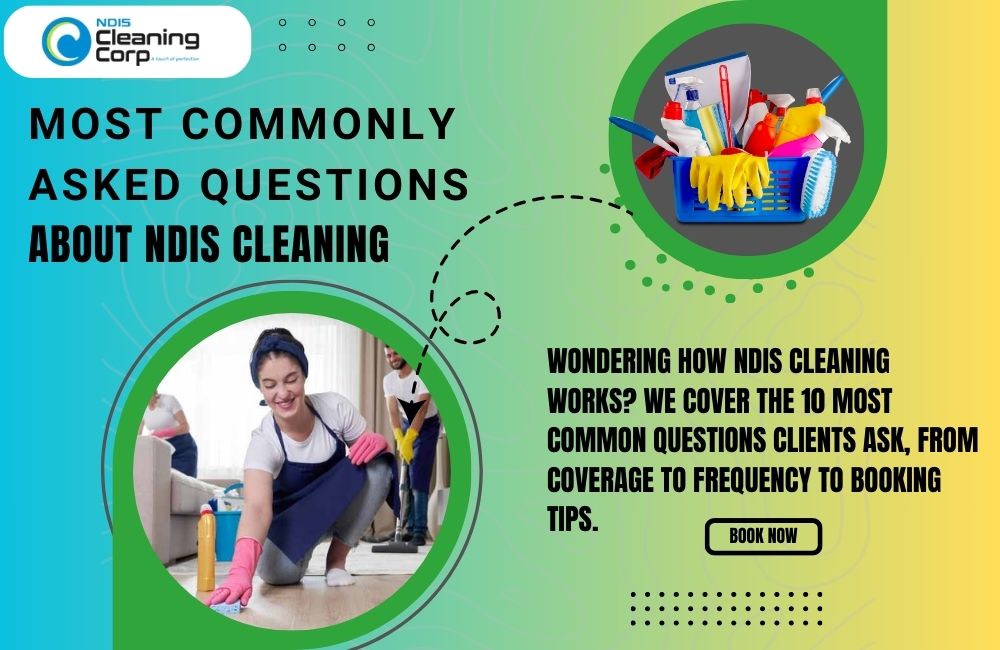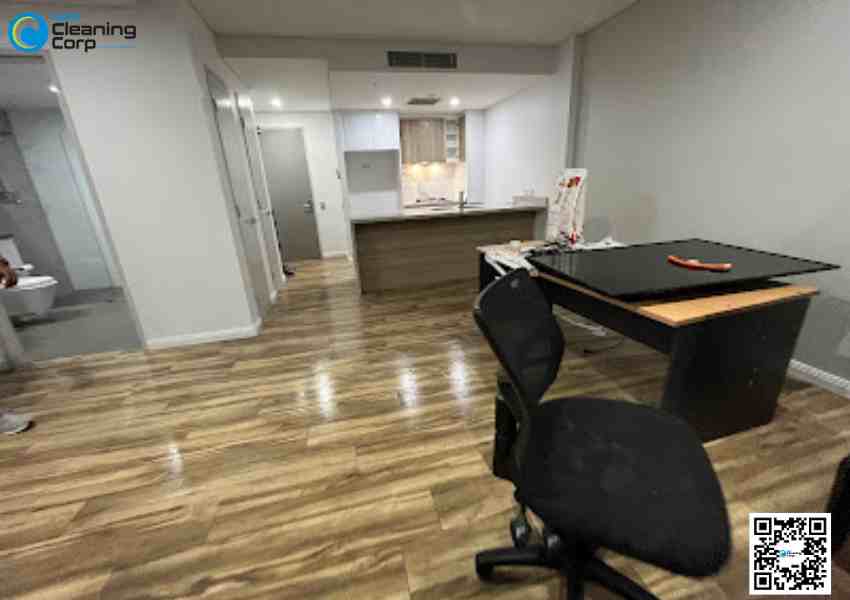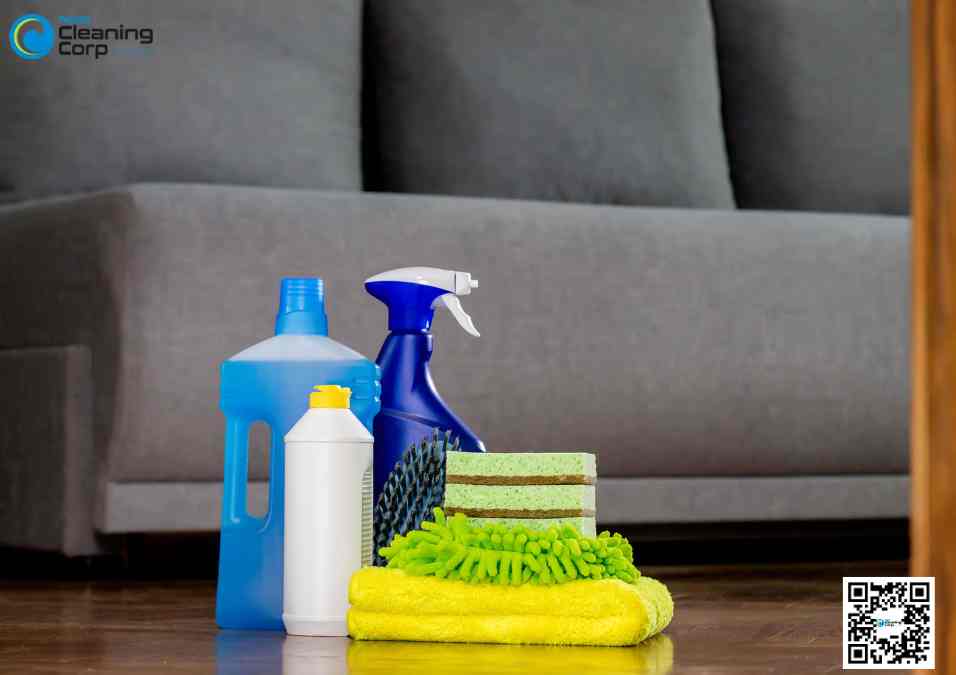Does the NDIS Fund Cleaning Services?
Yes. The NDIS does fund cleaning services — but it...
As the owner of NDIS Cleaning Corp., I’ve seen firsthand how a clean and comfortable environment can make all the difference in the lives of NDIS participants. A clean space isn’t just about tidying up; it’s about creating a sanctuary that enhances their quality of life. I’ve worked with many families and caregivers who have shared their stories of how a well-organized, hygienic home can help a loved one feel more independent, comfortable, and empowered.
This post will delve into practical, easy-to-follow tips on how to create a clean and comfortable space for NDIS participants. I’ll also share some real-life examples and answers to common questions I get asked regularly. So, whether you’re a caregiver, family member, or someone directly managing an NDIS participant’s home, you’re in the right place for advice and inspiration!

When we talk about NDIS participants, we’re referring to a diverse group of people with various physical, mental, and emotional needs. What they all have in common is that they require a home environment that supports their unique needs, promotes independence, and fosters a sense of well-being. A clean, organized space isn’t just about looks; it plays a vital role in their daily lives.
Take my client, Sarah, for example. Sarah is a young woman living with a physical disability, and after we helped her family organize and clean her home, the difference was remarkable. Sarah felt more in control of her environment, which had a positive impact on her emotional health. She reported feeling less anxious and more able to engage with the world around her. A clean environment provides physical safety, mental clarity, and emotional comfort—key ingredients for independent living.
When a space is clean, participants are less likely to experience physical health issues like allergies or respiratory problems, and the mental clarity that comes with having a tidy, organized environment can reduce stress and promote a calm, focused mind. Moreover, familiarity and comfort are key. When people with disabilities can recognize their space and feel at ease in it, it greatly reduces anxiety and helps them thrive.
The NDIS has specific standards when it comes to cleanliness and accessibility within homes. These standards ensure that the environment is safe, accessible, and comfortable, which is essential for participants’ well-being. As a provider of cleaning and maintenance services, I’m always keeping up to date with these standards to ensure that my clients’ homes meet the NDIS requirements.
For example, cleanliness plays a critical role in preventing health risks like infections or the spread of bacteria. Accessibility, on the other hand, ensures that participants can easily navigate their environment without obstacles. It’s not just about aesthetics; it’s about practical, everyday needs—whether that means clear walkways, accessible bathrooms, or ensuring that items are within easy reach.
One of the most valuable aspects of working within the NDIS system is the funding available for cleaning and home maintenance services. This funding can cover everything from regular cleaning to special home modifications. It’s there to make sure that participants live in environments that help them feel supported and independent. Knowing how to access these funds can make a huge difference for families and individuals who need extra assistance.
Now, let’s get into some practical steps you can take to ensure the space you’re creating for NDIS participants is clean, safe, and comfortable. These aren’t just theoretical tips—they’re things I’ve seen work in real homes, with real people.
One of the most immediate ways to improve a space is by decluttering. Clutter can lead to physical accidents—tripping, falling, or knocking things over. For participants with mobility challenges, this is a serious concern. By reducing unnecessary items, we can create clear pathways and safer spaces. I’ve seen many clients, like Greg, who struggle with limited mobility, benefit from simple changes like removing excess furniture and organizing spaces so that everything is easily accessible.
A good rule of thumb is to keep walkways and main areas clear. This not only prevents accidents but also promotes a sense of order. Simple storage solutions, like baskets, shelves, and bins, can help keep things organized without overwhelming the space. For example, installing wall-mounted shelves to keep essentials at eye level or within easy reach is an effective way to maximize space while maintaining a tidy environment.
High-traffic areas like the kitchen, bathroom, and bedroom require regular attention to ensure they stay hygienic. A clean kitchen reduces the risk of contamination, while a well-maintained bathroom ensures that participants can safely and comfortably perform daily activities. As part of the services I provide, we always make sure to use non-toxic, gentle cleaning products that won’t irritate skin or cause allergies. Cleaning products can make a huge difference, and there are plenty of eco-friendly, NDIS-approved options available.
For example, I once worked with a family whose child had severe respiratory issues. We switched to natural cleaning solutions, removed any harsh chemicals, and deep-cleaned the space regularly to ensure the air quality was optimal. Not only did this improve their child’s health, but it also gave the family peace of mind.
Involving participants in cleaning routines where possible is another great way to make them feel empowered. Even small tasks like wiping down surfaces or organizing their personal items can give them a sense of ownership and independence.
When it comes to furniture, comfort and functionality should always come first. Ergonomic chairs, adjustable beds, and chairs that provide proper back support are essential in promoting both comfort and mobility. For instance, one of our clients, Mark, who uses a wheelchair, needed a custom chair that allowed him to reach higher shelves. After we installed a set of adjustable, wheelchair-accessible furniture, Mark was able to use his space more independently.
For people with limited mobility, adaptive furniture options like lift chairs or adjustable beds can be game-changers. These pieces not only improve comfort but also make the space more accessible. It’s important to choose furniture that suits the participant’s specific needs, making their space both comfortable and easy to navigate.
A sensory-friendly environment can do wonders, especially for participants who are sensitive to light, sound, or textures. Simple adjustments, like using softer lighting or installing dimmer switches, can make a big difference. One of my clients, Zoe, has a sensory processing disorder, and we installed soft LED lights and chose calming, neutral-colored furniture that doesn’t overwhelm her senses.
Texture is another important factor. Smooth, soft fabrics and tactile surfaces can make a space feel more inviting. I always recommend opting for non-abrasive fabrics for furniture and using rugs or cushions with soft textures to provide comfort and a sense of safety.
Air quality is often overlooked, but it’s incredibly important for NDIS participants, especially those with respiratory concerns. Regular ventilation, air purifiers, and even certain houseplants can significantly improve indoor air quality. I’ve worked with clients who experience asthma or other respiratory issues, and incorporating air purifiers into their space has helped immensely.
Houseplants, like peace lilies or snake plants, are great at filtering the air and can bring a calming, natural element into the home. Ensuring that the home is well-ventilated—whether through natural airflow or mechanical ventilation systems—is another easy but essential way to keep the space fresh and healthy.
A clean environment is most effective when it’s maintained consistently. Establishing cleaning routines is key. I always recommend creating a cleaning schedule that’s simple and manageable—this could be as easy as dedicating 10 minutes every day to wipe down surfaces or vacuum common areas.
Involving NDIS participants in the cleaning process, where appropriate, helps them build independence and gives them a sense of control over their environment. It’s about finding what works best for them—whether it’s delegating certain tasks or simply setting up systems that make regular cleaning easier.
When it comes to cleaning for NDIS participants, it’s not just about having a tidy space—it’s about using the right tools, services, and systems that support their health and independence. Over the years, I’ve worked with countless families and caregivers, and one thing I’ve learned is that having the right tools and a reliable cleaning service can make all the difference in how a home functions. Let’s dive into some of the key tools and services that can make NDIS cleaning a bit easier, more efficient, and safe.
When you’re caring for someone who is a participant in the NDIS, it’s essential to have access to cleaning services that understand their unique needs. I’ve always said that cleaning isn’t just about wiping down surfaces—it’s about making a space that’s safe, hygienic, and functional for the person living in it. Specialized cleaning services tailored for NDIS participants ensure that every corner of the home is cleaned according to strict standards that align with the NDIS guidelines.
One of the things that sets us apart at NDIS Cleaning Corp. is our deep understanding of what’s required to meet those standards. We don’t just clean for cleanliness; we clean for accessibility and health. Whether it’s ensuring the bathroom is safe for someone with limited mobility or using hypoallergenic products in a space sensitive to respiratory issues, we take extra care in everything we do.
When searching for certified cleaning services, it’s important to look for businesses that are NDIS registered. These services are required to follow guidelines around safety, accessibility, and hygiene, which are critical for participants. Also, make sure that the cleaning team is experienced in working with individuals who have specific needs, whether that’s related to mobility, mental health, or other considerations.
I remember one client, Grace, who used our cleaning services because she struggled with asthma. She was so relieved that we used only non-toxic, gentle cleaning products, which didn’t aggravate her condition. It’s moments like these that remind me why our work matters—it’s about improving the quality of life for the people we serve.
In my experience, having the right tools makes a world of difference, not just for the cleaning team but also for the participant. There are a few must-have tools that can make cleaning both efficient and safe in a shared or sensitive living environment.
These tools are simple, but they go a long way in ensuring a clean and safe space for NDIS participants. They’re also great for reducing the time and energy spent on cleaning, allowing participants or their caregivers to focus on other important things.
Cleaning and maintaining a space that’s NDIS-friendly doesn’t have to be a solo effort. Building a support network is essential, and it’s something I always encourage families to do. I know that caring for someone with specific needs can be overwhelming, but when you have the right people around you, it becomes much more manageable.
Start by engaging family members and friends. Many participants enjoy being involved in daily tasks, so having a cleaning schedule where everyone pitches in can make the job easier and more enjoyable. One of my clients, Ben, loves being involved in small cleaning tasks, like wiping down the kitchen counter or organizing his bookshelves. It gives him a sense of ownership over his space, which is crucial for his independence and mental well-being.
Another great option is community programs or volunteer networks. Many local groups offer volunteer cleaning services for people who are disabled or elderly, and they can help with routine cleaning tasks or provide extra support when needed. I’ve worked with several clients who have benefited from these programs. It’s also a great way for the community to get involved and provide meaningful assistance.
Creating a support network can help you stay consistent with cleaning and maintenance routines, and it ensures that the participant feels involved and cared for in a way that works for them.
When it comes to creating NDIS-friendly spaces, real-life examples always provide the best insight. I’ve had the privilege of working with so many wonderful clients, each with their own unique needs and preferences. Here are a few inspiring stories of NDIS participants who transformed their spaces—and their lives—by making a few thoughtful changes.
Zoe is a young girl with autism who had a difficult time adjusting to new environments. Her family reached out to me because they were looking for ways to make her bedroom a place where she could feel calm and secure. Together, we focused on creating a sensory-friendly space that was both functional and comforting for her.
We started by replacing harsh overhead lights with soft, warm lighting that wouldn’t overwhelm her. We also used tactile materials, like soft rugs and textured pillows, which helped Zoe feel grounded. Her favorite part of the room, however, was the corner nook with soft cushions where she could retreat to when she needed a quiet moment. These simple changes had a profound impact on her behavior—she started to feel more comfortable in her space and was better able to relax at the end of the day.
Tom is a participant who lives with mobility challenges, and one of his biggest frustrations was his bathroom. It wasn’t accessible enough for him to use comfortably on his own, so his family reached out for help. We worked on a bathroom renovation that included adding grab bars, a shower seat, and a walk-in tub, all of which helped Tom maintain his independence.
We also made sure the bathroom was cleaned regularly and safely, using gentle products to avoid any irritation. Tom now has the confidence to use his bathroom independently, and his family has noticed a huge improvement in his overall quality of life. For Tom, these changes have given him a sense of pride and ownership in his home.
It’s all about starting with small tasks and building routines that fit the participant’s abilities. For some, even tasks like folding laundry or sorting items can be incredibly empowering. I’ve worked with many clients who feel more independent and engaged when they participate in the cleaning process. The key is to make it enjoyable and manageable.
When cleaning for NDIS participants, it’s essential to choose products that are free from harsh chemicals. Look for eco-friendly, hypoallergenic products that won’t irritate the skin or respiratory system. Products like natural disinfectants, vinegar-based cleaners, and plant-based detergents are excellent choices.
Yes, the NDIS can cover cleaning and home maintenance services as part of the participant’s support plan. It’s important to discuss these needs with the NDIS planner or coordinator to ensure that cleaning and home modifications are included. To apply for funding, you’ll need to submit a request and provide the necessary documentation to show how these services will improve the participant’s well-being and independence.
Creating a clean and comfortable environment for NDIS participants isn’t just about making things look nice—it’s about building a space that supports their health, independence, and overall well-being. By choosing the right furniture, establishing hygiene routines, and leveraging professional services, you can create a home that enhances the quality of life for those who need it most.
Remember, a clean and well-organized space can make a huge difference. Whether it’s through simple tools or community support, every step you take to make a home more comfortable will empower NDIS participants to live their best lives.

Yes. The NDIS does fund cleaning services — but it...

Alright, let’s get straight into it. These are the questions...

NDIS cleaning services are specifically designed to cater to the...

The role of professional cleaning in maintaining a safe and...

Studies consistently show that living in a clutter-free, organized space...